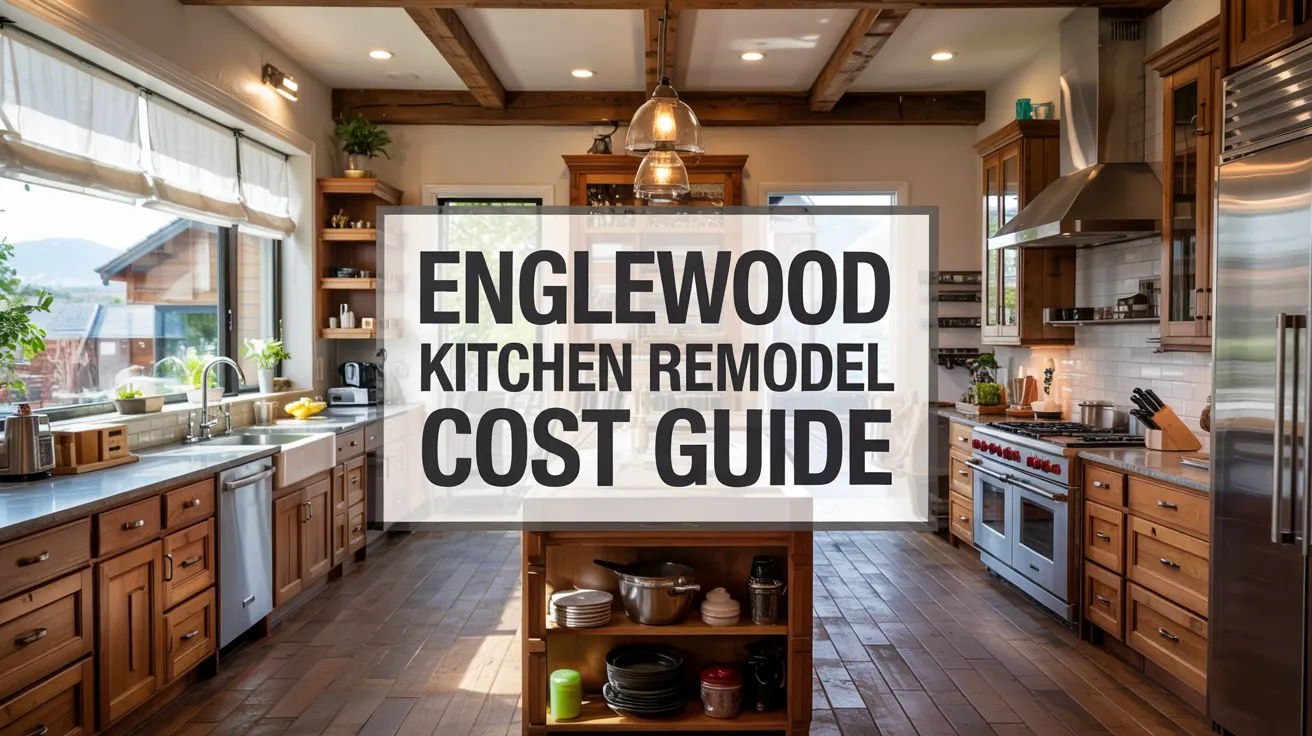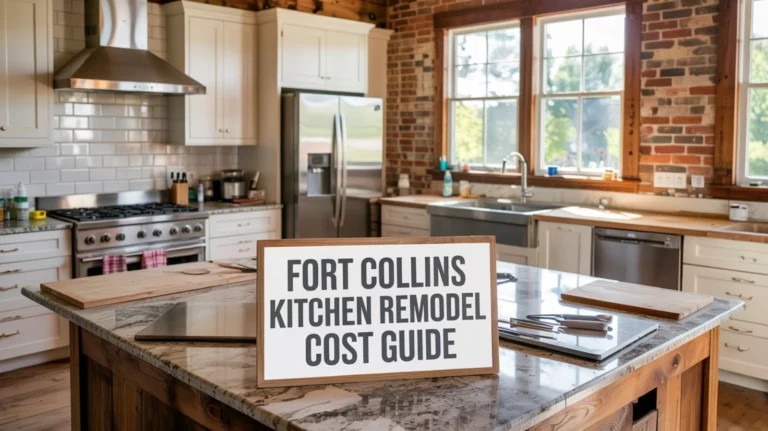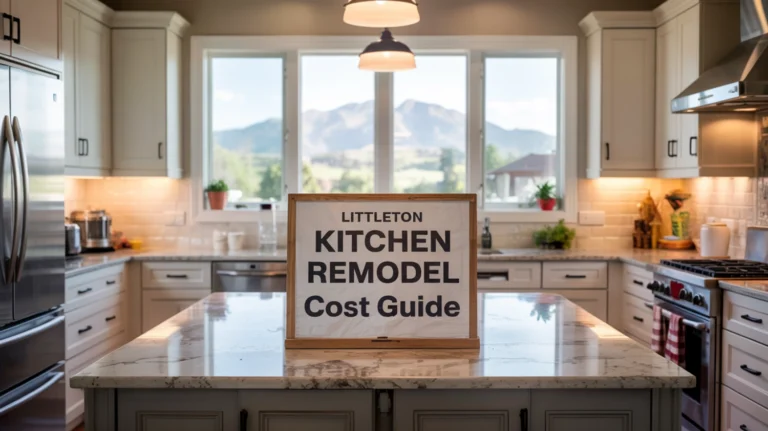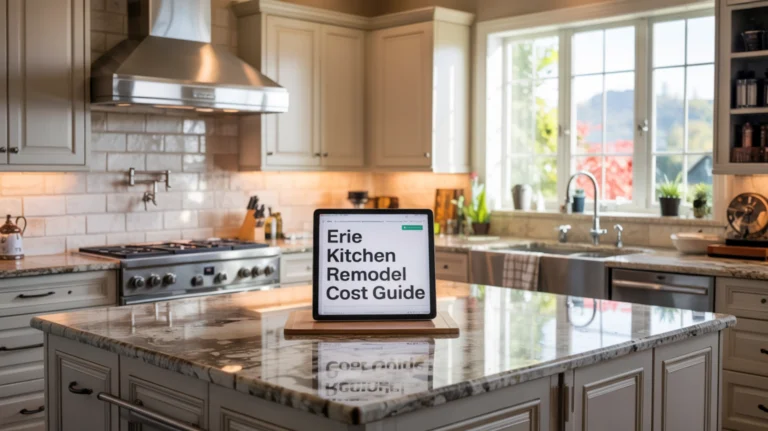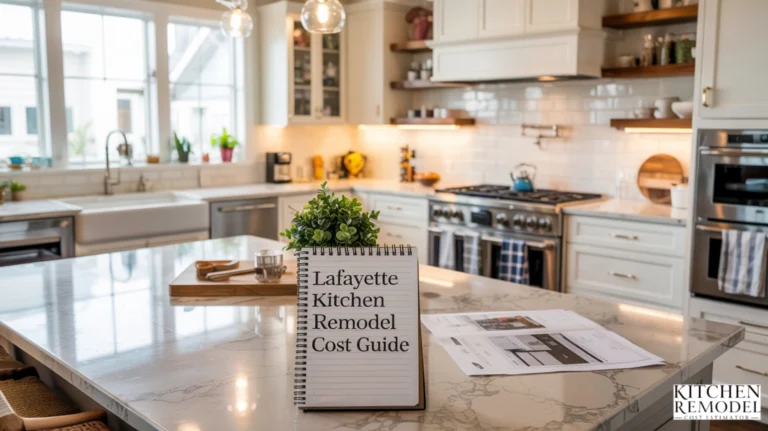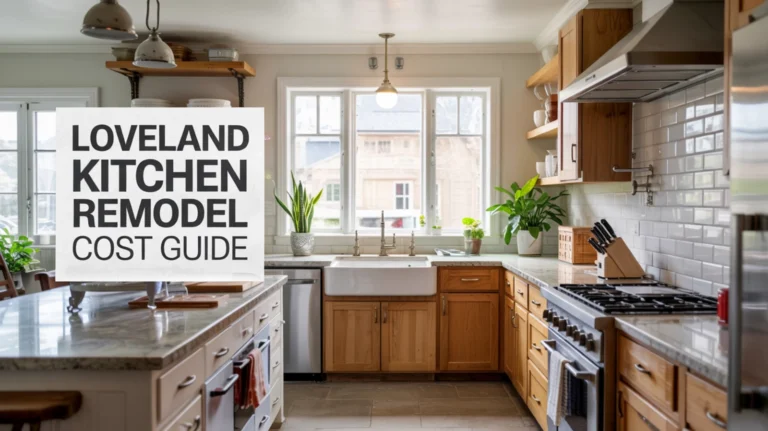In Englewood, our kitchen renovations reflect the same practical mountain sensibility that defines Colorado living – thoughtful investments that balance functionality with natural beauty. Our market sits at a fascinating crossroads where Western practicality meets growing design sophistication, creating renovation patterns distinctly different from national trends.
The decisions you make about scope, materials, and timing will shape not just your daily experience but your home’s long-term value in our unique Front Range market.
What does a kitchen remodel actually cost in Englewood today?
The average kitchen remodel cost in Englewood, Colorado ranges from $20,000 to $60,000. Smaller renovations may cost about $10,000, while high-end remodels with custom features and premium appliances can exceed $75,000. Final pricing depends on material quality, design scope, and contractor labor rates in the area.
Englewood Kitchen Remodel Cost Calculator
Get an estimate for your kitchen renovation based on your specifications.
Estimated Kitchen Remodel Cost
Overall Kitchen Remodel Cost Ranges in Englewood
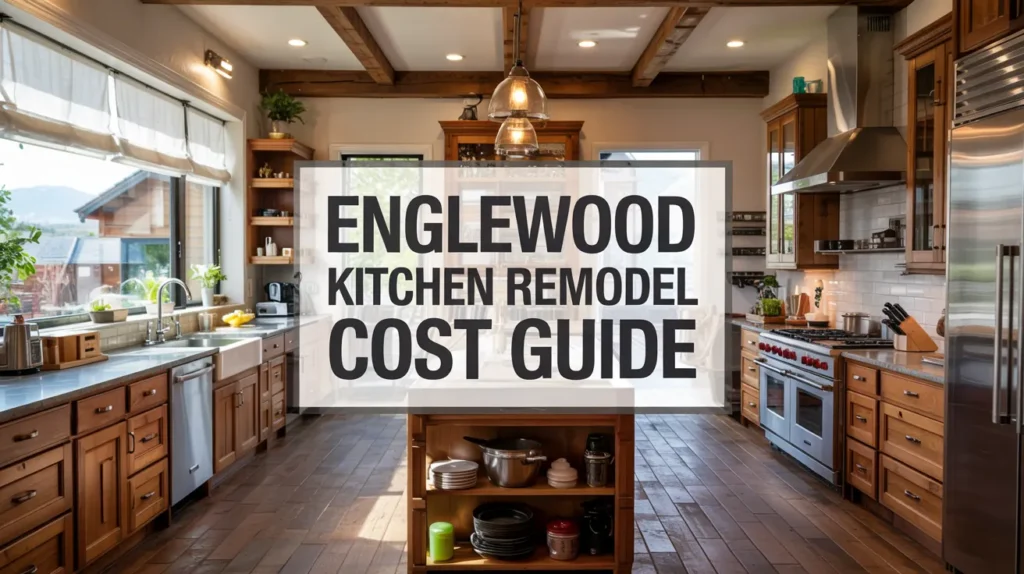
So you’re thinking about transforming your kitchen in Englewood, Colorado? Let’s talk numbers—because this investment could range from modest to eye-popping.
What exactly will you pay? That depends entirely on your ambitions. Are you looking for a simple refresh or dreaming of a complete overhaul with custom everything?
Research reveals that kitchen remodels in Englewood span from $14,500 to over $70,000. That’s quite the spread, right? This wide range reflects the incredible diversity of kitchen projects—from quick cosmetic updates to transformative renovations that change everything.
Looking at the broader Denver metro area (which closely mirrors Englewood’s market), typical costs fall between $15,000 and $50,000. Still a substantial commitment, but at least it narrows things down a bit.
But let’s break it down further to help you pinpoint where your dream kitchen fits:
Basic remodels focusing on refreshes like repainting cabinets? You’re looking at $7,000 to $10,000. Not cheap, but certainly the more affordable route.
Stepping up to mid-range remodels with higher quality materials and minor layout changes? Budget between $11,000 and $25,000.
Going for luxury with significant layout changes, custom cabinetry, and premium appliances? Prepare to invest anywhere from $38,000 to upwards of $150,000.
Need some specific examples? A minor remodel (cabinet refacing, updated appliances, new countertops and flooring, fresh paint) averages around $24,000. A major remodel including semi-custom cabinetry, a kitchen island, and all the fixings typically runs about $69,000. And those upscale remodels with all the bells and whistles? They average around $136,000.
Even your kitchen’s layout affects costs. Galley kitchens might range from $5,000 to $25,000, L-shaped kitchens from $10,000 to $50,000, and U-shaped kitchens from $17,500 to $75,000.
The connection between project scope and cost is clear—more significant changes and premium materials naturally cost more. While specific numbers may vary between reporting agencies, the trend holds true: the more elaborate your vision, the deeper you’ll need to dig.
Given Englewood’s proximity to Denver and their interconnected housing markets, Denver cost data serves as a solid indicator for Englewood projects. Just be aware that local contractor pricing and material availability might cause slight variations.
Average Cost per Square Foot for Kitchen Remodels
Want another way to estimate your kitchen renovation costs? Let’s look at price per square foot—a handy metric that helps you compare across different kitchen sizes.
In Denver (and by extension, Englewood), remodeling costs typically run between $190 and $375 per square foot. That’s quite a range, isn’t it? It reflects the same factors we’ve already discussed: renovation level and material quality.
But here’s where it gets interesting—kitchen size actually influences the per-square-foot rate.
For smaller kitchens (70-100 sq. ft.), you’ll typically pay between $190 and $375 per square foot. That translates to total project costs between $13,300 and $37,500.
Medium-sized kitchens (100-200 sq. ft.) follow a similar pattern with the same per-square-foot range, bringing total investments to $19,000 to $75,000.
But what about those spacious gourmet kitchens? For large kitchens (200+ sq. ft.), the entry point jumps significantly. You’re looking at $275 to over $562.50 per square foot, with totals ranging from $55,000 to $112,500 or more. Why the higher starting point? Larger kitchens often incorporate more premium features as standard elements.
Another source suggests a broader range of $100 to $250 per square foot in Denver, with basic cosmetic upgrades potentially costing as little as $75 per square foot. This lower figure typically applies to very minimal work—surface-level changes without replacing major materials or tackling structural modifications.
Let’s get specific: One completed kitchen remodel came in at $377.10 per square foot, while a DIY hybrid approach in another case resulted in $266 per square foot. The pattern is clear—comprehensive professional renovations land at the higher end of the spectrum.
What’s driving these numbers? Both kitchen size and your design choices dramatically impact per-square-foot costs. While smaller and medium kitchens might share similar rate ranges, larger kitchens often demand a higher minimum investment.
The variation in estimates between sources? That likely stems from differing definitions of what constitutes a “basic” remodel and which elements are included.
And don’t forget—homeowners taking the DIY route might achieve lower per-square-foot costs by eliminating labor expenses. Just remember that those savings come with tradeoffs: your time, effort, and potential headaches if things don’t go as planned.
Return on Investment (ROI) for Kitchen Remodels in Englewood
Let’s talk about everyone’s favorite question: “Will I get my money back when I sell?”
For Englewood homeowners, understanding the potential return on investment (ROI) is crucial before demolishing that first cabinet. ROI represents the percentage of your remodeling costs you might recoup when selling your home.
In the Denver area (our best proxy for Englewood), kitchen remodel ROI varies dramatically—from 38% to a whopping 96.1%. What determines where you land on this spectrum? Primarily project scope, materials, and feature selection.
Here’s the surprising part: minor kitchen remodels in Denver yield an exceptional average ROI of 97.4%, outpacing national averages. These modest updates (averaging around $27,492) focus on cost-effective improvements like cabinet refacing, countertop replacement, and hardware updates.
Thinking of going bigger? Midrange kitchen remodels offer a sweet spot—balancing modern upgrades with cost efficiency—yielding a healthy 74.8% ROI with an average investment of $79,982.
But what about those magazine-worthy luxury renovations? Unfortunately, major or upscale remodels with extensive structural changes and high-end finishes typically return less of your initial investment, simply because of their higher upfront costs.
National data backs this up. Minor kitchen remodels show an average ROI of 81.1%, while midrange major remodels dip to 59%, and upscale major remodels bottom out at 53.5%.
Looking specifically at the Mountain region (including Colorado), a major midrange kitchen remodel might recoup up to 67.2% during resale. Even more telling? Colorado homes with “renovated kitchen” mentioned in their listing descriptions sell for 2.5% more than expected.
What does all this mean for your Englewood kitchen plans?
The consistently high ROI for minor kitchen remodels suggests that buyers in this market place significant value on updated kitchens—even if the updates aren’t extensive. This makes focusing on cost-effective improvements financially prudent if you’re mainly concerned with resale value.
While dramatic renovations certainly enhance appeal and functionality, their lower ROI stems from larger initial investments that might not fully translate to the sale price—especially if your upgrades far exceed neighborhood standards.
Remember: the local real estate market plays a vital role here. Strong demand for updated kitchens in Englewood means even modest renovations can significantly boost home value. Just be mindful of your neighborhood’s price point and buyer preferences to avoid overspending on high-end or niche materials that might not yield proportional returns.
Common Kitchen Remodeling Materials, Costs, and Standards
Material selection makes or breaks your kitchen remodel—both aesthetically and financially. Let’s explore what goes into Englewood kitchens and what you’ll likely pay.
Countertops, cabinets, and flooring typically consume the biggest chunks of your material budget. In Englewood, popular countertop options include granite, marble, and quartz—but at what cost?
Quartz countertops range from $59 to $130 per square foot, while granite runs between $43 and $140 per square foot. Prefer natural stone options like quartzite, soapstone, or marble? Budget between $57 and $170 per square foot.
Looking for budget-friendly alternatives? Laminate countertops cost substantially less at $19 to $45 per square foot.
Real Englewood projects have seen countertop installations ranging from $1,055 to $3,652, featuring materials like Stonemark Quartz and Granite, Silestone, and LX Viatera.
Now, about those cabinets—they’ll typically gobble up about 29% of your total remodel budget. The numbers vary widely by type and material:
- Utility cabinets: $500 to $3,000
- Corner cabinets: $180 to $1,000
- Base cabinets: $100 to $500
- Wall cabinets: $100 to $300 per unit
If you’re eyeing custom kitchen cabinets in Englewood, prepare for costs between $2,620 and $13,485 on average. Local companies like Wedgewood Cabinetry offer custom options in various materials, including locally sourced wood that’s acclimated to Denver’s climate—potentially enhancing durability.
Design trends in Denver influence cabinet material choices significantly. Hardwood remains popular for traditional designs, while textured melamine, laminate, or high-gloss acrylic dominate contemporary styles.
Flooring typically represents about 5% of your total budget. National installation costs average around $3,162, with material costs per square foot including:
- Tile: $15-$20
- Hardwood: $6-$25
- Engineered wood: $4.50-$16
- Laminate: $3-$13
- Vinyl: $2-$14
Laminate flooring installations in Englewood have ranged from $148 to $3,278, depending on area size and project scope.
Appliances usually claim about 14% of your remodel budget. Costs vary dramatically by type and brand, with high-end appliance packages potentially exceeding $12,000.
Don’t forget plumbing and electrical work—essential components typically accounting for 6% and 5% of the budget, respectively.
Beyond costs, it’s worth noting relevant industry standards. ASTM International develops standards for various kitchen materials and equipment. Their Committee F26 on Food Service Equipment plays a significant role in setting standards for energy efficiency (relevant when selecting appliances) and the performance of kitchen equipment like ovens and sinks.
While these standards primarily target commercial applications, they highlight the importance of industry-recognized benchmarks for safety, performance, and material quality that you should consider when making selections for your residential kitchen.
Permitting Requirements and Associated Fees in Englewood
Ever heard the saying “it’s better to ask permission than forgiveness”? When it comes to kitchen remodels in Englewood, Colorado, that’s absolutely true.
Navigating permits might seem like bureaucratic hassle, but it’s a critical step for any significant kitchen project. The Englewood Building Division (part of the Community Development Department) oversees these requirements, and they’re serious business.
Good news: Englewood utilizes an online permit system (IMS) for electronic submission of project applications, permits, and contractor licenses. This modern approach streamlines what could otherwise be a paperwork nightmare.
Here’s what you need to know: All contractors working in Englewood must be licensed by the city. Planning to DIY? You’ll typically need to submit a homeowner affidavit in addition to the necessary permits.
Permit requirements follow the building codes adopted by Englewood. As of late 2023, permits are reviewed under the 2021 International Residential Code, 2021 International Plumbing Code, and 2023 National Electric Code, among others. These codes ensure your renovation meets established safety and quality standards.
What about permit fees? While specific Englewood kitchen remodel permit fees weren’t directly provided in our research, neighboring Denver’s fee structure offers a useful reference:
In Denver, permit fees are typically calculated based on project valuation. For projects valued between $25,001 and $50,000, you’ll pay $220 for the first $25,000 plus $8 for each additional $1,000. For projects valued between $50,001 and $100,000, that increases to $420 for the first $50,000 plus $7 for each additional $1,000.
Total permit costs in Denver range from $200 to $2,500, reflecting the diverse scale of remodeling projects. Additional fees may apply for same-day plan reviews, reinspections, or after-hours inspections.
Given Englewood’s adoption of international building codes, most kitchen renovations involving structural changes, plumbing, or electrical modifications will require permits. Wondering about your specific project? It’s best to consult directly with the Englewood Building Division.
While exact Englewood permit fees aren’t detailed here, the Denver structure provides a reasonable budgeting baseline. Expect larger and more complex kitchen remodels to incur higher permit fees.
One significant advantage? Englewood’s online permitting system makes applications, payments, and communication with Building Division staff much more efficient than the old paper-based processes.
Popular Kitchen Design Trends in the Englewood Area and Their Cost Implications
Wondering what’s hot in Englewood kitchens right now? Let’s explore current design trends and—more importantly—how they might impact your budget.
Recent trends in the Denver area (which heavily influence Englewood) show a distinct shift away from cooler, stark palettes. What’s replacing them? Warmer, more natural aesthetics—soft beige, warm taupe, deep greens, and rich wood finishes that create inviting, organic spaces.
Natural wood tones like white oak and walnut are particularly popular in cabinetry, adding warmth and depth. These trends might drive up demand (and potentially prices) for specific wood species and natural-toned materials.
Function is taking center stage alongside form. Homeowners are prioritizing smart storage solutions—deep drawers, pull-out shelves, built-in spice racks, and appliance garages that maximize space and minimize clutter. While these features dramatically enhance usability, they often require specialized hardware and custom cabinetry, adding to your bottom line.
Mixed materials and textures are gaining serious momentum. Combinations of wood, stone, matte black hardware, and metal accents add depth and visual interest. This approach allows for more personalized, custom looks but requires careful planning and material selection, which can influence your budget.
Are you environmentally conscious? You’re not alone. Sustainability and eco-friendly choices are increasingly important for Denver-area homeowners. This includes energy-efficient appliances, recycled materials, and low-VOC cabinetry finishes. These choices contribute to a more environmentally responsible kitchen but might involve higher initial investments than conventional options.
Statement backsplashes and bold fixtures are becoming popular focal points, adding personality without requiring complete renovations. Brightly colored kitchen islands and bold accent colors like green, coral, and teal are also emerging trends. These design elements add unique touches, but cost implications vary widely depending on your specific material and fixture choices.
Have you heard of the “Unkitchen” concept? It’s gaining traction—kitchens that blend seamlessly with the rest of the home through hidden appliances and integrated cabinetry. This approach often requires custom design work, potentially impacting cabinetry and appliance integration costs.
As you plan your Englewood kitchen remodel, consider which trends align with your personal style and which might offer the best long-term value. Remember that the most expensive trend isn’t necessarily the one that will bring you the most joy—or the best return on investment.
Cost Breakdown of Kitchen Remodel Components in Englewood
Ever wonder exactly where your kitchen remodel dollars go? Let’s break down the typical cost distribution for Englewood kitchen renovations.
pie showData
title Englewood Kitchen Remodel Costs
"Cabinets" : 26
"Labor" : 31
"Appliances" : 12.5
"Countertops" : 8.5
"Flooring" : 5
"Lighting & Electrical" : 5
"Plumbing" : 6
"Backsplash" : 5
"Other" : 1Cabinets consistently claim the largest portion of your budget—typically ranging from 22% to 29%. No surprise there, given they dominate your kitchen’s visual impact and functionality.
Labor costs follow closely as the second-largest expense, ranging from 17% to as high as 45% in some lower-end remodels. That’s right—almost half your budget might go to skilled hands rather than physical materials.
Appliances usually account for 11% to 14% of total costs. That percentage can swing dramatically based on whether you’re installing basic models or professional-grade equipment.
What about those beautiful countertops? They typically represent 7% to 10% of your budget—a relatively small percentage considering their outsized impact on your kitchen’s appearance.
Flooring generally accounts for about 5% of total costs, while lighting and electrical work take another 5%. Plumbing requirements typically absorb around 6% of your budget.
Don’t forget the backsplash—usually claiming about 5% of your total investment. The remaining portion (approximately 2% to 9%) goes toward miscellaneous costs, potentially including design fees.
How does this distribution shift between different project tiers? Basic or lower-end remodels might allocate a larger percentage to labor if using simpler materials, as more of the budget focuses on installation rather than premium products.
High-end renovations often direct more of the budget toward premium materials and custom features. In one detailed budget for a luxury kitchen remodel, appliances and cabinets represented particularly significant expenditures.
| Component | Typical Percentage |
|---|---|
| Cabinets | 22% – 29% |
| Labor Costs | 17% – 45% |
| Appliances | 11% – 14% |
| Countertops | 7% – 10% |
| Flooring | 5% |
| Lighting and Electrical | 5% |
| Plumbing | 6% |
| Backsplash | 5% |
| Other (Design, Misc.) | ~2% – 9% |
Use these percentages as a starting point when planning your Englewood kitchen remodel budget. For accuracy, obtain detailed quotes for each component based on your specific design choices and current local market rates for materials and labor.
Project Duration and Potential Challenges in Englewood Kitchen Remodels
“So how long will this take?” It’s probably the second-most common question after “How much will it cost?”
gantt
title Kitchen Remodel Timeline in Englewood
dateFormat YYYY-MM-DD
axisFormat %b
todayMarker off
section Planning Phase
Design & Planning :a1, 2025-01-01, 60d
Material Selection :a2, after a1, 30d
Permitting :a3, after a1, 21d
section Preparation
Order Materials :b1, after a2, 5d
Material Lead Time :b2, after b1, 42d
section Construction
Demolition :c1, after a3, 10d
Rough-in Work :c2, after c1, 14d
Inspections :c3, after c2, 2d
section Finishing
Cabinet Installation :d1, after c3, 14d
Countertop Template & Install :d2, after d1, 14d
Backsplash & Flooring :d3, after d2, 7d
Fixture & Appliance Install:d4, after d3, 5d
Final Touchups :d5, after d4, 5dKitchen remodel timelines in Englewood vary dramatically based on project complexity. Minor refreshes might wrap up in a few weeks, while extensive renovations can stretch across several months.
Typically, from construction start to completion, expect 4 to 12 weeks. But don’t be fooled by that range—the entire process, including planning, can span from 2 to 6 months or longer for highly customized projects.
Let’s break down the timeline:
The planning phase itself often takes 2 to 3 months. Why so long? This critical stage ensures every detail is thoroughly considered before demolition begins.
Demolition typically requires 1 to 2 weeks, followed by the rough-in stage for plumbing, electrical, and HVAC systems (another 1 to 2 weeks).
Inspections during the rough-in phase usually take just a day or two—a quick but crucial checkpoint.
The finishing stage—installing cabinets, countertops, flooring, and appliances—can stretch across 2 to 3 months, especially if you’ve opted for custom cabinetry.
Don’t forget material lead times! These can average around 6 weeks and significantly impact your overall timeline.
What could possibly go wrong? Several challenges commonly arise during kitchen remodels:
Unforeseen structural issues like uneven or warped walls can complicate cabinet and countertop installation, potentially requiring additional time and expense to correct.
Material delivery delays or scheduling conflicts with contractors frequently extend project timelines. Custom items are particularly prone to unexpected delays.
Integration challenges can arise when blending new materials with existing home structures—sometimes more complex than initially anticipated.
Perhaps most importantly, prepare yourself for disruptions to daily routines. Limited or no kitchen access for an extended period means you’ll need alternative meal preparation plans. Setting up a temporary kitchen is highly recommended, especially for longer renovations.
Want to minimize these headaches? Choose experienced, reputable contractors familiar with Englewood’s housing stock. Their local knowledge can help anticipate and mitigate potential issues.
The keys to a smoother remodeling experience? Proper planning, clear communication with your contractor, and realistic expectations about timelines and potential complications.
Conclusion
Kitchen renovations in Englewood reflect our unique Colorado character—practical mountain sensibility balanced with growing design aspirations. The investment spans from modest $7,000 refreshes to $150,000+ transformations that redefine your home’s identity.
What matters most? Minor remodels deliver remarkable 97% returns in our market, while even major renovations recoup a healthy 75%—concrete evidence that updated kitchens remain one of your smartest property investments in Englewood.
The numbers tell a clear story: cabinets command 22-29% of your budget, with labor claiming 17-45% depending on scope. Our current design preferences favor warmer, natural materials that connect our indoor spaces to Colorado’s spectacular outdoor environment.
Successful renovations balance aspiration with pragmatism. The thoughtful partnership with professionals who understand Englewood’s specific dynamics creates spaces that enhance both daily living and long-term value—the true measure of renovation success in our distinctive Colorado market.
FAQ
What is a reasonable budget for a kitchen remodel?
A reasonable budget for a kitchen remodel ranges from $25,000 to $60,000, depending on the scope and materials. Mid-range projects cost $25,000–$35,000, while high-end upgrades exceed $60,000.
Is $10,000 enough for a kitchen remodel?
$10,000 is enough for minor updates like painting and hardware replacement but not structural changes or full renovations. It suits small-scale refreshes.
Is $30,000 enough for a kitchen remodel?
$30,000 is sufficient for a mid-range remodel with new appliances, cabinets, and countertops but limited luxury finishes or structural changes.
How much should a 12×12 kitchen remodel cost?
A 12×12 kitchen remodel costs $14,400–$28,800 on average, depending on materials and labor rates. Basic updates cost less; custom features cost more.

